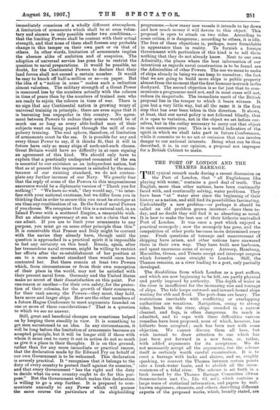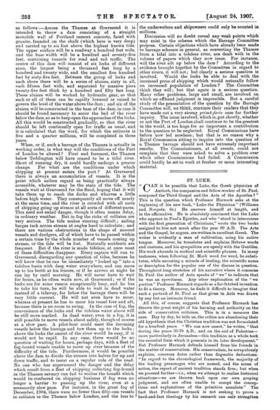THE PORT OF LONDON AND THE THAMES BARRAGE. T HE cynical
remark made during a recent discussion on the Port of London, that " all Englishmen like playing with water," contains a good deal of truth. The English, more than other nations, have been continually faced with, and continually solving, water problems. They have been " at " water ever since the beginning of their history as a nation, and still find its possibilities fascinating. Undoubtedly a new problem—or perhaps it should be called an old problem grown insistent—faces them to- day, and no doubt they will find it as absorbing as usual. It is how to make the best use of their hitherto unrivalled Port of London. It was once a port which enjoyed a practical monopoly ; now the monopoly has gone, and the competition of other ports becomes more determined every year. Fresh questions of tonnage and measurement of shipping have arisen, and other nations have answered them in their own way. They have built new harbours, and spent enormous sums of money. Antwerp, Hamburg, Marseilles, Genoa, and Trieste accept and intercept cargoes which formerly came straight to London. Still, the Thames remains, as a river leading to a port, only partially developed.
The disabilities from which London as a port suffers, and which are now beginning to be felt, are partly physical and partly imposed by authority. The depth of water in the river is insufficient for the increasing size and tonnage of ships. The tide keeps outward- and inward-bound ships waiting for ebb and flood. The port-dues are heavy. The restrictions inevitable with conflicting or overlapping authorities are vexatious. Navigation, owing to strong tides, bends in the river, ships crowded in a narrow channel, and fogs, is often dangerous. So much is admitted, and to cope with these difficulties various remedies have been proposed, none of which, however, has hitherto been accepted ; each has been met with some objection. We cannot discuss them all here, but wish instead to draw attention to one which has just been put forward in a new form, or, rather, with added arguments for its acceptance. We do not necessarily accept all the arguments, but the scheme itself is certainly worth careful examination. It is to erect a. barrage with locks and sluices, and so, roughly speaking, to convert the Thames between certain points into a fresh-water basin, and to abolish all the incon- veniences of a tidal river. The scheme is set forth in a book issued by the Thames Barrage Committee (Swan Sonnenschein and Co., 12s. tid. net), which contains a large mass of statistical information, and papers by well- known engineers, chemists, and others, describing different aspects of the proposed works, which, broadly stated, are as follows :—Across the Thames at Gravesend it is intended to throw a dam consisting of a straight monolith wall of Portland cement concrete, faced with granite, founded on the chalk (which here is very deep) anti carried up to six feet above the highest known tide. The upper surface will be a roadway a hundred feet wide, and the base width will be a hundred and seventy-five feet, containing tunnels for road and rail traffic. The centre of this dam will consist of six locks of different sizes, the largest being a thousand feet long by a hundred and twenty wide, and the smallest five hundred feet by sixty-five feet. Between the group of locks and each shore there will be a series of sluices, sixty in all, each fifteen feet wide, and separated by massive piers twenty-five feet thick by a hundred and fifty feet long. These sluices will be worked by hydraulic gear, so that each or all of them can be rapidly lowered or raised to govern the level of the water above the dam ; and six of the sluices will be constructed in the base of the dam, in case it should be found necessary to scour the bed of the river below the dam, so as to keep open the approaches of the locks. All this would be constructed gradually, so that the river should be left continually open for traffic as usual, and it is calculated that the work, for which the estimate is five and a quarter millions, will be completed in three years.
When, or if, such a barrage of the Thames is actually in working order, in what way will the conditions of the Port of London be altered ? First and foremost, the Thames below Teddington will have ceased to be a tidal river. Short of running dry, it could hardly undergo a greater change. For what are the conditions under which shipping at present enters the port ? At Gravesend there is always an accumulation of vessels. It is the point which sailors regard as being practically always accessible, whatever may be the state of the tide. The vessels wait at Gravesend for the flood, hoping that it will take them up to reach the docks and wharves a little before high water. They consequently all move off nearly at the same time, and the river is crowded with all sorts of shipping going up stream at all sorts of differentipaces. This need not entail danger, though it often means delay, in ordinary weather. But in fog the risks of collision are very serious. The tide makes steering difficult ; sailing barges tack across stream at angles hard to calculate ; and there are various obstructions in the shape of moored vessels and dredgers, all of which have to be passed within a certain time by the whole number of vessels coming up stream, or the tide will be lost. Naturally accidents are frequent. But if the river is made tideless, at once most of these difficulties disappear. Every captain will run to Gravesend, disregarding any question of tides, because he will know that he can be immediately " locked up " into a tideless basin with deep water everywhere, and can move up to his berth at his leisure, or if he arrives at night he can lay by until morning. He will never have to wait for hours, as he often waits now, at Gravesend; or if the locks are for some reason exceptionally busy, and he has to take his turn, he will be able to wait in dead water instead of a tideway, for below the barrage there will be very little current. He will not even have to moor, whereas at present he has to moor his vessel fore and aft, because there is no room to swing. In the case of fog, the convenience of the locks and the tideless water above will be still more marked. In dead water, even in a fog, it is still possible to move vessels about safely, though of course at a slow pace. A pilot-boat could meet the incoming vessels below the barrage and tow them up to the locks ; above the locks the ascent of the river would be easy, if it would not be rapid. In any case, there would be no question of waiting for hours, perhaps days, with a fleet of fog-bound vessels unable to move up river because of the difficulty of the tide. Furthermore, it would be possible above the dam to divide the stream into halves for up and down traffic, and to insist on a regular rule of the road. No one who has experienced the danger and the delay which result from a fleet of shipping collecting fog-bound in the Thames estuary can fail to realise the benefit which would be conferred on shipping business if fog were no longer a barrier to passing up the river, even at a necessarily slow pace. For instance, in the great fog of December, 1904, there were no fewer than fifty-one vessels in collision in the Thames below London, and the loss to the underwriters and shipowners could only be counted in millions.
Discussion will no doubt reveal any weak points .which may exist in the scheme which the Barrage Committee propose. Certain objections which have already been made to barrage schemes in general, as converting the Thames from a tidal into a tideless river, are dealt with in the volume of papers which they now issue. For instance, will the river silt up below the dam ? According to the evidence brought together by the Committee in regard to other rivers, it will not; but clearly a serious question is involved. Would the locks be able to deal with the increased press of shipping which would naturally follow an increased population of London ? The Committee think they will; but that again is a serious question. Many other problems, large and small, are involved on which an offhand judgment is impossible. But a careful study of the presentation of the question by the Barrage Committee will, we think, convince their readers that they have made out a very strong primd-facie case for further inquiry. The issue involved, which is, put shortly, whether or not the Port of London shall continue to be the greatest in the world, is too huge for so important a contribution to the question to be neglected. Royal Commissions have before now led nowhere ; but that is no reason why a Royal Commission sitting to inquire into the question of a Thames barrage should not have extremely important results. The Commissioners, at all events, could not complain that they were asked to solve a problem over which other Commissions had failed. A Commission could hardly be set to work at fresher or more interesting material.



































 Previous page
Previous page